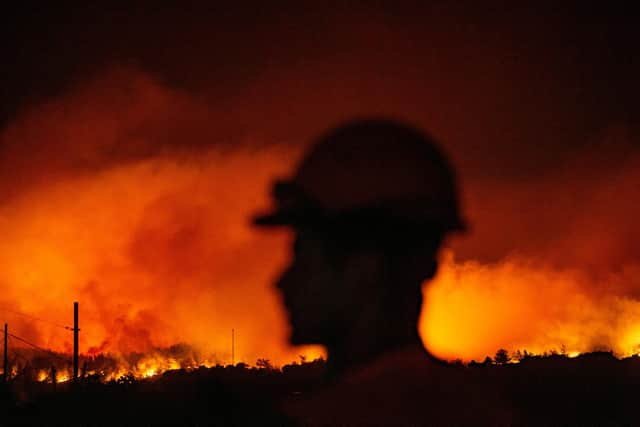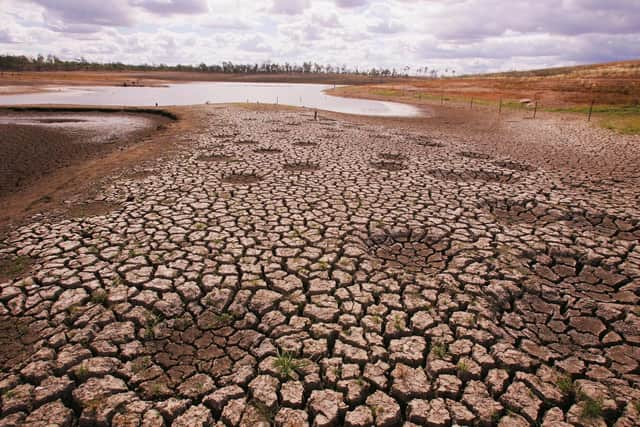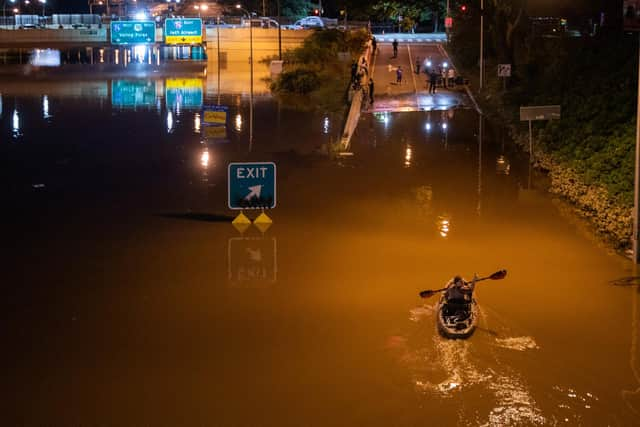Climate change: Greed for material wealth has pushed us to the brink of losing a stable climate forever – Professor Paul Ekins
But perhaps he too, like so many of us, has been appalled by the multiple pictures on our TV screens in the years since 2015 of the world on fire in one country, underwater in another, plagued by drought in a third, and buffeted by freak weather elsewhere.
It gives me no pleasure to point out these phenomena have been predicted for decades by those of us who have been working on these issues since the early 1990s. They have come earlier, and with more force, than was then generally foreseen. But their arrival should come as absolutely no surprise.
Advertisement
Hide AdAdvertisement
Hide AdThey are the logical and inevitable result of trapping vastly more heat in the atmosphere by increasing the concentration of greenhouse gases. It is a pity that Johnson and his ilk did not “grow up” and listen to climate scientists decades earlier. We would then have been in a far better place to address the climate crisis before our societies are overwhelmed by it.
But we are where we are. The good news is it’s not yet too late to avoid the worst effects of global heating. The bad news is there are still few signs that, beyond the rhetoric about “net zero” and “growing up”, politicians in the UK or elsewhere are prepared to bite the bullet of taking the necessary actions to achieve this.
It is not as if we haven’t known for some time what must be done. The use of energy is at the heart of all human economic and social activity. It is crucial for economic growth and development. At present, it is also by far the single largest source of the major greenhouse gas, carbon dioxide, which derives from the burning of fossil fuels, which still account for some 80 per cent of the world’s energy use.
It is blindingly obvious that, if we want to mitigate climate change, countries need to reduce fossil-fuel use. Yet since the first Intergovernmental Panel on Climate Change report in 1990, the use of fossil fuels has increased by more than 60 per cent. So it should come as no surprise that global carbon dioxide emissions have increased by a similar amount.


The reason is that no country has been prepared to clamp down on fossil fuel use to the extent required. And it seems the world is still far from acknowledging this imperative, in order to keep the average global temperature increase to 1.5C, now widely agreed to be necessary to avoid potentially catastrophic climate change. The United Nations Environment Programme estimated last year that companies’ and countries’ plans to extract fossil fuels exceeded the amount required to achieve this target by a mind-boggling 120 per cent.
In 2021, the world’s premier authority on energy, the International Energy Agency said bluntly that, to keep the 1.5C target within reach, there should be no investment in new coal mines, or new oil and gas fields.
Yet even the UK government, which prides itself on being a ‘global leader’ on climate change, is planning to open new oil and gas fields in the North Sea, and has not ruled out a new coal mine in Cumbria. So the UK, along with other countries, needs to “grow up” – but apparently not just yet.


To be fair to politicians, it is understandable they are still unwilling to bite the bullet of reducing fossil fuel use, because there are few signs that, if they tried to do this with the stringency and urgency required, they would be voted back into office.
Advertisement
Hide AdAdvertisement
Hide AdMany of the activities that are at the heart of popular conceptions of a ‘good life’ – flying, driving, meat-eating, larger and warmer homes, and second and third homes – and the infrastructure and industries that are needed to provide them are very high producers of greenhouse gases. People do not take kindly to suggestions they should do, or have, less of these things.
In time, technologies may be developed, as they have been for renewable electricity, that enable the emissions from these activities to be reduced. And implementation of these technologies should create new jobs and industries, such as producing electric vehicles instead of internal combustion engines, biofuels for aircraft, heat pumps to replace gas boilers, and plant-based meat substitutes.
But implementing these technologies at scale will take time and involve policies which many people, despite professed concern about climate change, will find intrusive and unacceptable.


Witness the outraged reaction of popular newspapers to the very mention of carbon or meat taxes, which are absolutely essential in a market-based economy to give incentives for the development and adoption of low or zero-emission alternatives to current high-emission products and services.
Some of such reactions are out of genuine concern that emission-reducing policies would have a disproportionate effect on low-income households. There are ways of mitigating these effects through compensation for extra costs, but these would require richer households to shoulder more of the costs.
The fact that the UK could cut aid to the poorest countries during the pandemic does not generate confidence that rich countries will be prepared to spread the costs of mitigating climate change according to ability to pay.
Growing up often entails the realisation that we cannot have everything we want. Poor countries and poor people in rich countries want what rich people in rich and poor countries have got. Rich people want still more.
It is not at all clear that such aspirations, which still largely drive economies everywhere, are compatible with the stable climate that we are now on the brink of losing forever.
Advertisement
Hide AdAdvertisement
Hide AdPaul Ekins is professor of resources and environmental policy at University College London
A message from the Editor:
Thank you for reading this article. We're more reliant on your support than ever as the shift in consumer habits brought about by coronavirus impacts our advertisers.
If you haven't already, please consider supporting our trusted, fact-checked journalism by taking out a digital subscription.
Comments
Want to join the conversation? Please or to comment on this article.
